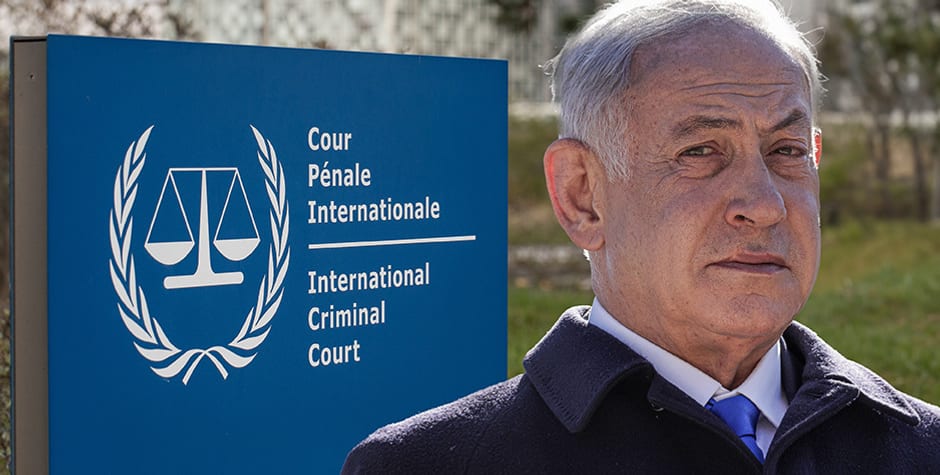UPDATE: ACLJ Seeks To Block ICC Arrest Warrants for Netanyahu and Other Israelis
Listen tothis article
In an interesting development at the International Criminal Court (ICC), the Pre-Trial Chamber I has granted the U.K.’s request to submit observations on whether the ICC can exercise jurisdiction over Israeli nationals.
On May 20, 2024, the ICC’s Prosecutor filed an application for arrest warrants against Israel’s Prime Minister Benjamin Netanyahu and Defense Minister Yoav Gallant, as well as Hamas leaders Yahya Sinwar, Mohammed Deif, and Ismail Haniyeh. All were accused of various crimes against humanity and war crimes.
ICC jurisdiction is based on the idea that, by joining the Rome Statute, Member States delegate their criminal jurisdiction to the ICC. Even though “Palestine” is not a State, in 2020, the ICC’s Prosecutor argued, and the Court agreed, that “Palestine” could be considered a State for the strict purpose of the Rome Statute only and, therefore, could delegate territorial jurisdiction to the ICC. The Pre-Trial Chamber at that time, however, left some jurisdictional questions open.
One of the questions was the implication of the Oslo Accords on the Court’s jurisdiction. In 1993 and 1995, Israel entered into agreements commonly referred to as the Oslo Accords with the Palestinian leaders, creating the Palestinian Authority (PA) as the interim government entity in the disputed territories and granting it jurisdiction over Palestinians. However, Israel retained criminal jurisdiction over Israeli citizens. Since the Palestinians never had jurisdiction over Israelis, it could not delegate the non-existent jurisdiction to the ICC.
In its request to submit observations, the U.K. correctly underscored that the Pre-Trial Chamber stated in 2021 that the relationship of the Oslo Accords could be dealt with at a later stage when the Prosecutor seeks arrest warrants. Since the Prosecutor has now filed applications for arrest warrants, the inquiry into the impact of the Oslo Accords over the Court’s jurisdiction has become pertinent.
While granting the U.K.’s request, the Pre-Trial Chamber also allowed others to submit requests for leave to submit observations on this issue.
Through our international affiliate, the European Centre for Law and Justice (ECLJ), which has special consultative status at the U.N., we have filed a request for leave to submit an amicus brief before the Pre-Trial Chamber, laying out reasons for why the ICC does not have jurisdiction to prosecute Israeli nationals. The request was submitted on July 3, 2024. If granted, we will file an amicus brief addressing the jurisdictional provisions in the Oslo Accords, the application of the Geneva Conventions, and Customary International Law to explain why the ICC cannot exercise criminal jurisdiction over Israeli nationals.
Buried under the legalese is a political war fought under the guise of achieving justice. To prosecute Israelis, the ICC has to violate several basic principles of international law. One of the principles the Rome Statute itself violates is that a treaty is not binding on States that are not party to it. Since the ICC is a creation of a treaty (i.e., the Rome Statute), we argue that it may not exercise jurisdiction over non-party States (like Israel or the U.S.) or their nationals.
However, the Rome Statute allows the ICC to exercise jurisdiction if a non-party State’s national commits a crime in the territory of a State Party. Since “Palestine” is not a state and does not have a defined territory – among the lack of meeting other criteria for statehood – the ICC has adopted a legal fiction to consider “Palestine” a State for the strict purposes of the Rome Statute only. Based on this theory, the Court believes it has jurisdiction over alleged crimes committed in the so-called “West Bank” and the Gaza Strip.
With the issue of the Oslo Accords before the Court, the Pre-Trial Chamber would also have to violate other basic principles of treaty interpretation in order to assert jurisdiction over Israeli nationals. We cannot stand by and watch.
Our international team is working on the amicus brief. Pray that the Court allows our request for leave to submit the brief.
UPDATE 07.22.2024: In a major move, the International Criminal Court just granted the ACLJ’s legal request to file a vital amicus brief before the Court in defense of Israel’s interests.
Our deadline is in just days, and we will be filing promptly. This could be the single most important legal action we've ever taken to defend Israel.
